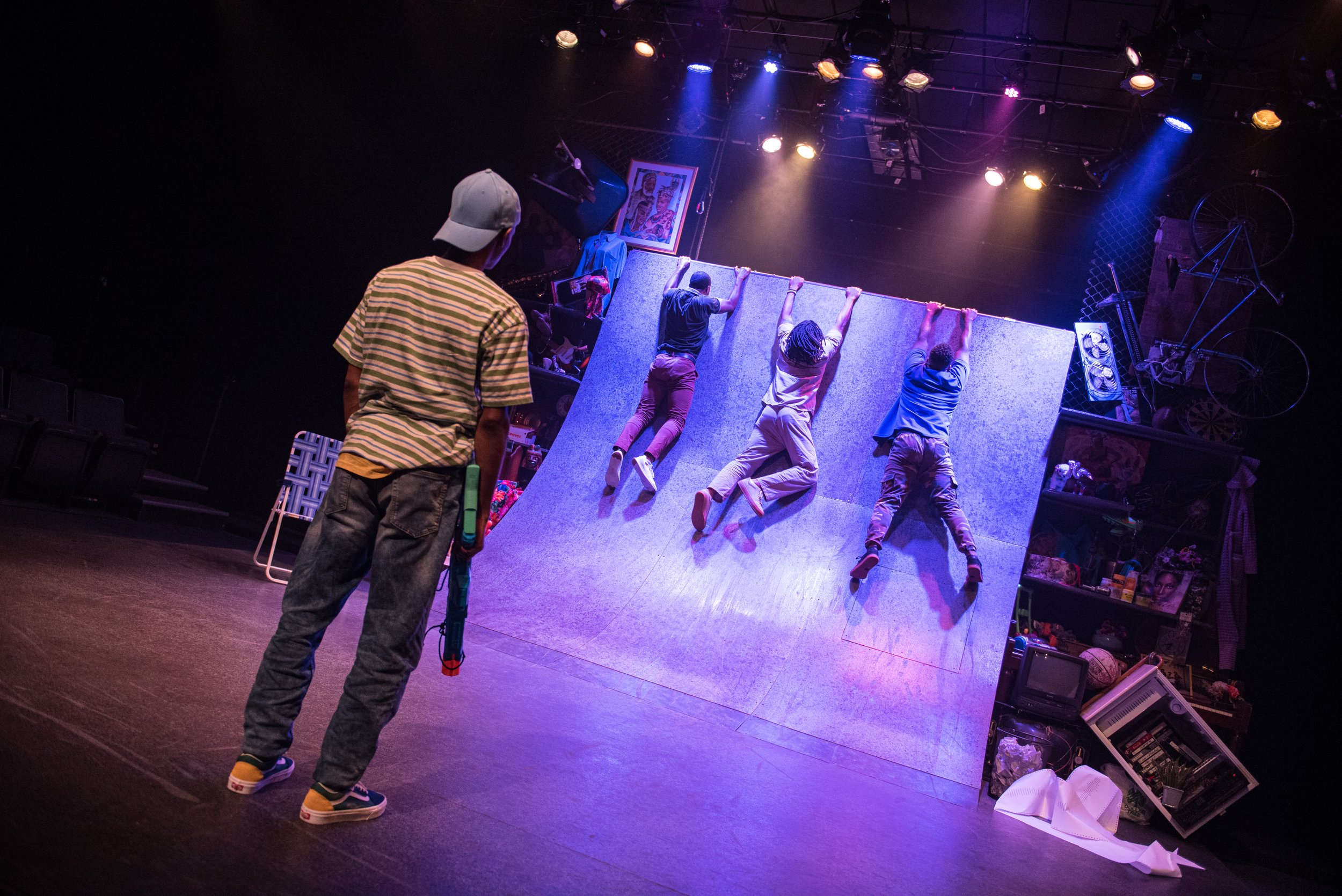By MARILYN JOZWIK
What kind of emotions swirl in the minds of black men as they watch so many dying violently and unnecessarily in their neighborhoods? Why do their lives seem to be so dispensable? Why isn’t their humanity recognized? Why are people afraid of them?
All the angst and anger of these unanswerable questions are demonstrated with the language of a poet, the grace of a dancer, the beauty of the sung word, the physicality of an athlete, all with the intensity of a raging fire in James Ijames “Kill Move Paradise,” directed by Marti Gobel.
Next Act Theatre’s opening show of the season, “Kill Move Paradise” comes on the heels of many needless, violent deaths suffered by blacks, mostly men, in the last few years. At one point, the names of dozens of blacks whose lives have been snuffed out prematurely are read as they continue to come in on a teletype machine. Many are names that are familiar, including Trayvon Martin, Dontre Hamilton, George Floyd and Philando Castile.
Daz (Dimonte Henning) and Grif (Ibraheem Farmer) act out their emotions in a scene from Next Act Theatre’s “Kill Move Paradise.”
In “Kill Move Paradise,” a black man, Isa (Marques Causey), appears on a huge steel gray ramp – sort of like the super slide at State Fair – clinging precariously to the top until he finally slides down. One by one, three other black men appear over or through the ramp.
All are confused about how they got to this place. Just moments before they were doing the mundane – driving in a car, selling CDs, playing with kids in the neighborhood. What is this place they’ve been hurled into? Daz (Dimonte Henning), the third to arrive, speculates, “could be heaven, could be hell.” Isa asks, “Which do you prefer?” Daz shouts at him, “I prefer to be alive!”
And so it is with the four, one just a kid, whose lives have been cut short so that now they await their “final destination.” All four peer into the audience shortly after they arrive, sometimes asking, “Am I scary?” or “Who are they?” or “Why are they here?” The scrutiny is disconcerting as each character carefully scans the audience, sometimes making a comment, maybe wondering whether this is the place of his final judgement.
The conversations are dense with emotion and stark language, like when Daz talks about what the abbreviated lives could’ve been with a rap-like litany or when the conversation turns to their legacy — sacrifice or martyrdom? They all had so much more to offer. Says Grif (Ibraheem Farmer), “I build, I make.” They consider what survival in life looks like: “I can make you immortal if you do what I tell you to do.”
Tiny (Joseph Brown Jr.) watches as Grif (Ibraheem Farmer), Isa (Marques Causey), and Daz (Dimonte Henning) desperately try to return to the world of the living in a scene from Next Act Theatre’s “Kill Move Paradise.”
A show with such an important message could’ve been a series of monologues, but writer ljames has so many theatrical skills that the show careens from one emotion to another, moving at the speed of light, sometimes with humor, song and creative movement. Passion and emotion aren’t words, they are screams and groans. They are desperate attempts to escape by negotiating the wall to get back to life. They are sometimes grotesque, sometimes beautiful, sculpture-like poses. They are pauses where there are just no words that will do.
There is hilarity as the quartet re-enacts old TV shows like “Fresh Prince of Bel-Air” and “The Jeffersons” with ironic twists as they dial through Hollywood versions, stereotypes and myths of blacks. They plead to be seen as people deserving of note and respect, and not cliches. The young Tiny (Joseph Brown Jr.), holding the plastic gun he died with, pleads, “The gun is not real, I am.” He, too, is anguished at landing in the hereafter waiting room. “What can I do to wash away my sins?” he pleads.
Yet, there is hope as Isa describes “eventual rapture,” with encouragement like “Don’t give up, don’t lose heart.”
Daz (Dimonte Henning) comforts Tiny (Joseph Brown Jr.) in a scene from Next Act Theatre’s “Kill Move Paradise.”
This talented quartet of performers has so much to unpack in this show and they do so brilliantly, handling the physicality, the often-beautiful language – even some melodic harmonies and in-sync dance – with energy and passion.
The four have a fabulous set to help them with their journey, which features a production design by Next Act’s Artistic Director David Cecsarini (who will be leaving Next Act at the end of the season) and set construction by Mitch Schmidt and Mike Van Dreser. The three worked to create an incredibly imaginative set, with the ramp to the next world a focal point flanked by reminders of the world just departed, including a bicycle, TV, wheelbarrow, dart board, Pittsburgh Pirates cap, basketball, numerous photos and other items of lives once lived. Lighting and sound (Maaz Ahmed, and Kemer Gobel and Josh Schmidt, respectively) also enhance the space with bolts of lightning, sounds of thunder and other effects, while Freedom Gobel created some clever poses as movement choreographer.
Ijames’ story covers a lot of ground and maybe would have been even stronger with a narrower focus. Nonetheless, it is the kind of remarkable, thought-provoking theater that we have come to expect from Next Act.
If you go
Who: Next Act Theatre
What: “Kill Move Paradise”
When: Through Oct. 16
Where: 255 S. Water St.
Info/Tickets: nextact.org



